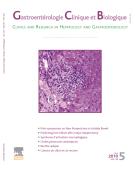Helminthes et maladies inflammatoires chroniques intestinales - 12/12/08

Résumé |
Actuellement, l’hypothèse communément admise pour expliquer le développement des maladies inflammatoires chroniques intestinales est une dysrégulation de la réponse immunitaire muqueuse dirigée contre des éléments de la flore intestinale, survenant chez des patients génétiquement prédisposés. La maladie de Crohn est fréquente dans les pays industrialisés où la prévalence des helminthiases est faible et réputée rare dans les pays en voie de développement où la majorité des individus sont exposés à ce parasite. De ces constatations a grandi l’hypothèse de l’hygiène : une moindre exposition aux agents infectieux ne permettrait pas un bon développement de notre système immunitaire dans l’enfance. Les helminthes, dont Trichuris suis, atténuent l’intensité de la réponse immunitaire chez l’homme et dans des modèles de colites inflammatoires expérimentales. La maladie de Crohn est classiquement associée à une réponse immunitaire de type T-helper (Th1) excessive. Les helminthes empêchent le développement d’une réponse Th1, induisent un profil cytokinique de type Th2 et stimulent les lymphocytes T régulateurs. Sur ces arguments immunologiques, les helminthes ont été proposés dans le traitement de la maladie de Crohn. Quelques essais cliniques ont suggéré l’efficacité et la bonne tolérance d’une exposition aux helminthes dans les maladies inflammatoires chroniques intestinales. Sa tolérance à long terme reste inconnue.
Il testo completo di questo articolo è disponibile in PDF.Summary |
The current etiologic model of inflammatory bowel diseases proposes a genetically predisposed host responding to a variety of environmental triggers by exhibiting an abnormal immune response to normal luminal flora. Crohn’s disease is common in highly industrialized western countries where helminths are rare and uncommon in less developed areas of the world where most people carry worms. From this observation grew the hygiene hypothesis, which states that our failure to be exposed to previously common infectious agents alters the immune repertoire established in childhood. Helminths diminish immune responsiveness in naturally colonised humans and reduce inflammation in experimental colitis. Crohn’s disease involves over reactive T-helper (Th1) pathways, and helminths blunt Th1 responses, inducing production of Th2 cytokines. Helminths also induce regulatory T cells to maintain host mucosal homeostasis. Thus, there is an immunological basis to expect that exposure to helminths such as Trichuris suis will prove beneficial in Crohn’s disease. Exposure to helminths may be effective in treating inflammatory bowel diseases and was well tolerated, according to the results of few studies. Its long-term safety remains unknown.
Il testo completo di questo articolo è disponibile in PDF.Abréviations : MICI, MC, RCH, TNF, T. suis, T. vulpis, T. trichiura, CDAI, SCCAI, UCDAI, SEP, Th, IL, INF, Ig, S. mansoni, H. polygyrus, TNBS, NOD, VIP
Mappa
Vol 32 - N° 12
P. 1064-1074 - Dicembre 2008 Ritorno al numeroBenvenuto su EM|consulte, il riferimento dei professionisti della salute.

